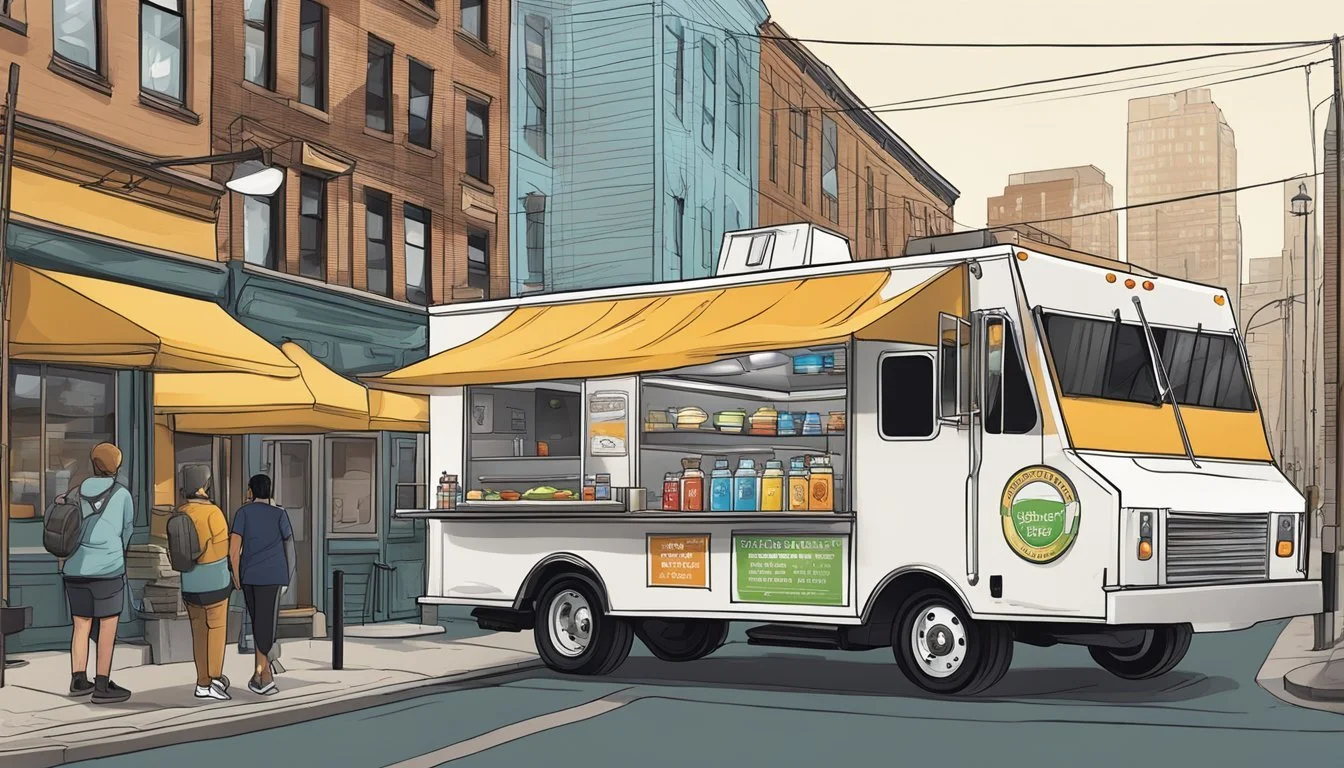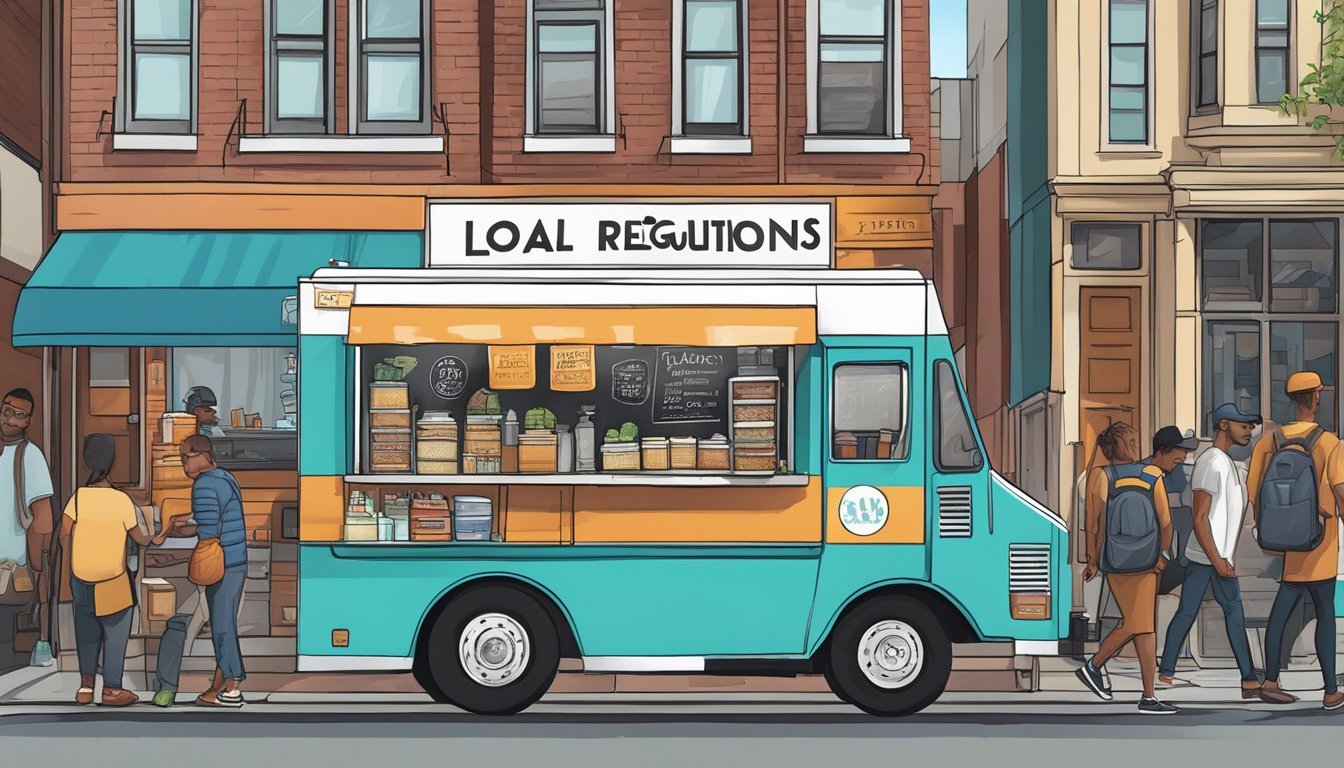Food Truck Laws Jersey City, New Jersey
Regulations and Permits Guide
Navigating the regulations surrounding food trucks in Jersey City, New Jersey, requires a clear understanding of the local laws. These laws ensure that food trucks operate in a way that is safe for consumers and fair within the market. In Jersey City, food truck operators are required to obtain a number of permits and licenses to maintain compliance with local health and business regulations.
The city has specific mandates that dictate where food trucks can park and operate. Having a comprehensive understanding of these regulations, such as the need for an Itinerant Food Truck Parking Permit, is crucial for food truck owners. This permit system contributes to maintaining organized street vending while minimizing potential conflicts with brick-and-mortar establishments.
Additionally, the adherence to food safety standards is a top priority for operators in Jersey City, and across New Jersey. This involves securing appropriate health permits and ensuring all employees working within the food truck have the necessary food handling certifications. Food trucks, being mobile retail food establishments, are subject to inspections by the local health department similarly to their stationary counterparts, underlining the importance of compliance for continued operation.
Licensing and Permits
In Jersey City, New Jersey, operating a food truck requires navigating through an assortment of licensing and permit regulations. Adherence to city ordinances and securing the correct documents are fundamental steps for vendors.
Obtaining a Vendor License
Vendors must acquire a Vendor License specific to food trucks to operate within Jersey City. The application process involves submitting pertinent details about the business structure, which can range from an LLC, Sole Proprietorship, or Partnership, to the City Council for review. The cost associated with these licenses can vary, and it's essential for vendors to incorporate this into their budget planning.
Health and Safety Permits
For food trucks, holding the proper Health and Safety Permits is as critical as having a good recipe. Food trucks are subject to regulations that ensure public safety and hygiene standards are met. This includes regular inspections by health officials, adherence to food safety regulations, and often an Employee Health Permit. Compliance is scrutinized to maintain the standards set by the Department of Health.
Sales Tax Permit Requirements
Every food truck conducting sales must manage tax obligations effectively. They are required to obtain a Sales Tax Permit and an Employer Identification Number (EIN). These permits allow the collection and remittance of sales tax, abiding by state and local tax ordinances. For a Restaurant on wheels, such as a food truck, this is an indispensable aspect of legally conducting business.
Operations and Zoning
Jersey City’s food truck laws ensure that mobile food vendors operate within specific areas and adhere to established regulations. These laws balance business opportunities with urban planning and public convenience.
Designated Food Truck Zones
In Jersey City, food trucks are permitted to operate within certain areas, known as food truck zones. Zone 1 includes high-traffic areas like Montgomery Street and Sussex Street, promoting accessibility for office workers and tourists. Conversely, Zone 2 might cover regions less central but still significant, such as around Columbus Drive. Each zone has its own set of rules for food truck operation to accommodate different neighborhood needs.
Operating Hours and Restrictions
Food truck vendors in Jersey City must operate within specific hours and restrictions to minimize disruption to local businesses and residents. For instance, trucks on Montgomery Street may have extended hours during weekdays to serve the lunchtime crowd, while those on residential Hudson Street may face more stringent limitations to respect the quiet, residential nature of the area. These time restrictions are part of the municipal code to preserve public peace and order.
Vehicle and Equipment Regulations
The city mandates strict vehicle and equipment regulations to ensure safety and hygiene. All trucks must comply with the Department of Health guidelines for cleanliness and food safety. Additionally, the local zoning ordinance may dictate where a truck can be parked overnight. Trucks found along Greene Streets and downtown areas might face more rigorous checks due to the higher population density and foot traffic in these zones. Compliance with these requirements is essential for the uninterrupted operation of a food truck in Jersey City.
Health and Safety Compliance
In Jersey City, New Jersey, food trucks must adhere to strict health and safety regulations to ensure public safety and compliance with local laws. These include routine health inspections, mandatory food handlers and safety training, as well as adherence to COVID-19 protocols and regulations.
Routine Health Inspections
Food trucks in Jersey City are subject to regular inspections by the local health department. These inspections are critical to ensuring that food trucks operate in accordance with the sanitation and food safety standards set by the New Jersey Department of Health. During inspections, all aspects of the truck's food handling and preparation areas are examined, including the condition of equipment and the presence of necessary permits.
Food Handlers and Safety Training
Employees working in food trucks are required to have valid food safety certification. Training programs such as ServSafe provide food handlers with the necessary knowledge on safe food preparation, handling, and storage. In New Jersey, at least one employee with a Food Protection Manager Certification must be on-site during hours of operation, ensuring that food safety practices are continuously implemented.
Covid-19 Protocols and Regulations
In response to the COVID-19 pandemic, food trucks must also follow specific health protocols mandated by the state. These include measures like frequent sanitization, social distancing where possible, and wearing of masks. Operators must stay informed about the latest COVID-19 regulations provided by the New Jersey Department of Health to remain in compliance and protect both employees and customers.
Business Structure and Management
When establishing a food truck in Jersey City, New Jersey, it's crucial for business owners to carefully consider the legal structure and the internal management framework of their operation. These decisions have significant legal and tax implications and are fundamental in determining the efficiency and effectiveness of business processes.
Choosing a Business Entity
Selecting the right business entity is a critical step for any food truck owner in Jersey City. The type of entity chosen will affect everything from liability exposure to tax obligations. For individual owners, a Sole Proprietorship might be the natural choice for its simplicity; however, it does not provide personal asset protection. Alternatively, creating a Limited Liability Company (LLC) offers liability protection and tax benefits. Meanwhile, Partnerships are suitable for ventures with multiple owners who are willing to share the profits and responsibilities. Larger operations may opt for a Corporation, which is more complex but brings benefits for raising capital.
LLC: Liability protection; pass-through taxation.
Sole Proprietorship: Simple setup; personal liability.
Partnership: Shared responsibility; direct profit allocation.
Corporation: Ability to raise capital; separate legal entity.
Managing Operations
Effective management of a food truck’s operations in Jersey City encompasses a broad array of tasks from logistics to ensuring compliance with local food service regulations. Business owners must develop a comprehensive business plan that outlines operational strategies including procurement, menu planning, location scouting, and customer service. Streamlining these operational aspects is crucial for long-term success and scalability. A business plan acts as a blueprint for the food truck’s daily functions and future growth.
Business Plan: Operational blueprint; strategic planning.
Compliance: Adherence to local food service regulations.
Building a Successful Team
Behind every successful food truck in Jersey City, there is a dedicated and skilled team. Building this team requires identifying individuals with the right mix of experience and attitude. Business owners should look for team members who are adaptable, work well in fast-paced environments, and share the business's vision. The size and nature of the entity, whether an LLC, Partnership, or Sole Proprietorship, will dictate the team structure and the roles of each member. Training and leadership are essential in fostering a cohesive and efficient team capable of delivering exceptional service.
Team Composition: Roles based on entity type and operational needs.
Training: Key for efficiency; ensures quality service.
Financial Aspects
When launching a food truck in Jersey City, New Jersey, it's essential for entrepreneurs to have a firm handle on the financial aspects of their operation. This understanding ensures sustainability and compliance with local vendor fees while grounding the venture in a solid business plan.
Understanding Fee Structures
Jersey City imposes specific vendor fees that food truck operators must be aware of. These fees vary, but they typically include application, licensing, and renewal costs. For example, the license required for food-handling establishments incurs a fee set by the city that must be paid annually. Operators should also account for the potential costs associated with health inspections and any other city-mandated evaluations.
Creating a Financial Strategy
A comprehensive business plan is crucial for food truck entrepreneurs. This plan must outline the cost structure, from initial investment in the food truck and equipment, to ongoing expenses such as ingredients, fuel, and maintenance. To set the venture up for success, operators should budget for the known vendor fees and have a reserve for unforeseen costs. A well-constructed business plan will also assist in securing funding, whether through loans or investors, underlining the importance of this financial roadmap.
Additional Considerations
When delving into the food truck business in Jersey City, New Jersey, operators must be mindful of specific regulations that govern alcohol sales, compliance with local laws, and how they procure their ingredients and partner with suppliers.
Alcohol Sales and Licensing
Selling alcohol from food trucks necessitates strict adherence to licensing requirements. In Jersey City, any vendor considering the incorporation of alcohol sales into their business model must first secure the necessary permits. It is pivotal that operators are familiar with state laws and local ordinances, including those specific to Greene Street or Kennedy Boulevard, before serving alcoholic beverages.
Adhering to Local Legislation
Legislation, such as that on Bergen Avenue or Sip Avenue, impacts how food trucks operate within city limits. A valid food handlers license is imperative for all food truck employees to ensure compliance with health and safety standards. Food truck owners should regularly review and understand the nuances of Jersey City’s food vending regulations to avoid penalties and ensure uninterrupted operations.
Selecting Ingredients and Suppliers
The choice of ingredients and suppliers is a cornerstone of food truck success in Jersey City. Operators should prioritize the sourcing of high-quality supplies, focusing on freshness to appeal to the health-conscious consumer. Establishing a trustworthy relationship with local suppliers around Park areas can result in a consistent and reliable inventory, providing customers with a dependable dining experience.







